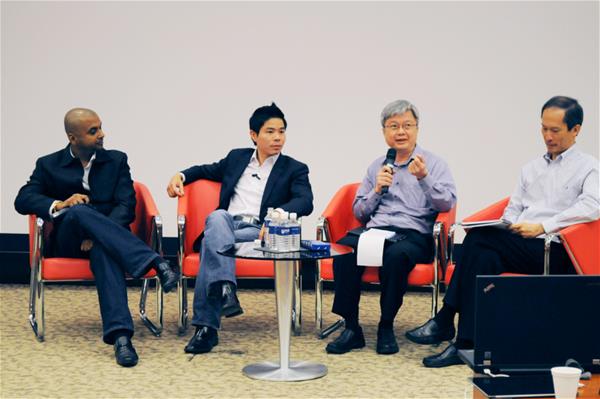You’re a senior executive and your idea of a nightmare is having your team glued to Facebook, Twitter and Foursquare at work.
Brian Cheng, Business Unit Executive of IBM Collaboration Solutions at IBM ASEAN opined that the use of social networks at work meant a smarter and happier workforce and the storing up of intellectual capital
Brian was speaking at the seminar Get Bold - Social Business Agenda. Held at ISS, the talk was jointly organised by ISS and the NUS Business School for students at both schools.
“Social media is not just about social; it is about how we interact and the tools that we are provided with,” explained Brian. “Banks ask me, “Why do I want that in my company? It’s going to reduce my productivity!” But at work today, every single one of your key initiatives is a collaborative effort. It is all done in a social manner where you have to talk to work together, to create materials and to bounce ideas off each other.”
He felt that social media gave rise to a smarter workforce. With employees located in different locations and, often, in different cities, the use of social media at work allows instant group discussions about a project and thus enables the entire team to be more productive.
He explained, “What you are doing is to mobilise your workforce; how to better allow your workforce to collaborate with each other.”

Responding to bold questions with bold answers was the order of the day for (from left) Representative from IBM; Brian Cheng, Business Unit Executive of IBM Collaboration Solutions at IBM ASEAN; Goh Boon Nam, ISS Chief of New Initiatives & Strategic Planning and ISS Chairman Christopher Chia.
There are other compelling reasons to use social media at work. For one, having a prominent presence on social media helps attract talent. Social media also helps employers retain these talents by making employees feel that they are being listened to. It also allows leaders to communicate their ideas and vision to their teams.
In addition, incorporating social media at work helps with the retention of knowledge within an organisation by storing information and making this knowledge readily available online to those who need them. It also allows teams to learn on each project.
The sum of it all? Said Brian, “Businesses are moving beyond using social media for fun, and towards integrating it into their business processes.”
If you would like to attend events like this in future, please write in to issmarketing@nus.edu.sg or visit our event page.